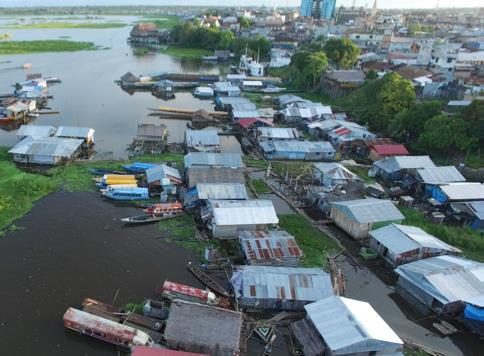
Landscape architecture, engineering, geography, nursing, dentistry, medicine, and other disciplines all have roles to play in achieving global health, yet many remain largely underrepresented in global health projects. Bringing together these untraditional partners and building long-term collaborative relationships is the aim of a joint University of Washington and Universidad Nacional Mayor de San Marcos (UNMSM) project that today was awarded the “100,000 Strong in the Americas Innovation” grant.
“This grant will provide opportunities for undergraduate and graduate students outside of traditional health fields to collaborate and participate in global health research and service learning,” said Dr. Joe Zunt, Professor of Global Health, University of Washington and co-lead on the project. “Students from underrepresented, yet critical, disciplines will be able to learn through action-oriented service learning activities in Peru and help nurture long-term relationships with the community of Claverito in Iquitos, Peru to improve human, ecological and environmental health.”
The “100,000 Strong in the Americas Innovation” grant will fund InterACTION Labs: An Interdisciplinary Service Learning Exchange Program, a UW and UNMSM project that will allow students and faculty to assess and address health disparities affecting the informal floating community of Claverito. Peruvian students participating in the program will be encouraged to travel to Seattle for skills training, cross cultural exchange of ideas and technology transfer, fostering the international mobility of students from both participating institutions. Participation in the program is anticipated to increase as the opportunity to impact human and animal health, environmental resilience, and social equity attracts students across disciplines from both universities.
The project builds on the Global Innovation Fund, which was awarded to Dr. Zunt and his team in December 2016 by the UW Office of Global Affairs. The Fund enabled six UW faculty members and two PhD students to travel to Peru in 2017 to participate in discussions in Lima and Iquitos with Peruvian colleagues with the objective of developing new research projects and additional research training opportunities for doctoral students and post-doctoral fellows who seek to enter academic careers in global health. The site visits and binational conferences and meetings supported by this Global Innovation Fund led to the development of three grant proposals, one of which was the UW Population Heath Initiative grant, which aims to assess and improve human and animal health, environmental resilience and social equity in Claverito.
“When governments, the private sector, and civil society collaborate on education, we address society’s most pressing concerns, we foster innovation, we create enduring relationships, we build 21st century workforce skills, and we expand knowledge networks. The Innovation Fund provides Peru and the United States with dynamic higher education partnerships as engines for economic prosperity,” said the United States Ambassador to Peru Krishna R. Urs.
For more information: www.100kstrongamericas.org/category/media/press-releases
Notes to editors:
Since January 2014, the 100,000 Strong in the Americas Innovation Fund is the dynamic public-private sector partnership between the U.S. Department of State, Embassies, Partners of the Americas, NAFSA: Association of International Educators, corporations, and foundations working together to stimulate connectivity and collaboration between higher education networks throughout the Americas.
The Innovation Fund inspires U.S. universities and colleges to team up with universities and higher education institutions in the rest of the Western Hemisphere to create new partnerships to increase student exchange and training programs and opportunities. Innovation Fund grants build institutional capacity, increase student mobility, strengthen regional education cooperation, and contribute to workforce development in the Americas. To date, the Innovation Fund has awarded 147 grants to teams of 288 higher education institutions from 25 countries in the Western Hemisphere region, and a total of 38 U.S. states benefit from Innovation Fund grant partnerships. Over 1,750 higher education institutions form part of the Innovation Network – with 1,000 in the United States. Learn more and join the Innovation Network: www.100kstrongamericas.org
The mission of Partners of the Americas is to connect people and organizations across borders to serve and to change lives through lasting partnerships. These partnerships create opportunity, foster understanding, and solve real-life problems. Inspired by President Kennedy and founded in 1964, under the Alliance for Progress, Partners is a non-profit, non-partisan organization with international offices in Washington, DC. www.partners.net or @partnersamerica
With 10,000 members worldwide, NAFSA: Association of International Educators is the largest non-profit professional association dedicated to international education programming and policy. www.nafsa.org or @NAFSA and www.connectingourworld.org or @ConnectOurWorld
CAF Development Bank of Latin America is a development bank created in 1970, made up by 19 countries, 17 in Latin America and the Caribbean, Spain, and Portugal as well as 14 private banks in the region. It promotes sustainable development through its lending, and support in the technical and financial structuring of projects in the public and private sectors of Latin America. CAF is also well known for its work in equity and social inclusion, environment, workforce development and climate change among other areas.
Sempra Energy, based in San Diego, is a Fortune 500 energy services holding company with 2016 revenues of more than $10 billion. The Sempra Energy companies' more than 16,000 employee s serve approximately 32 million consumers worldwide.